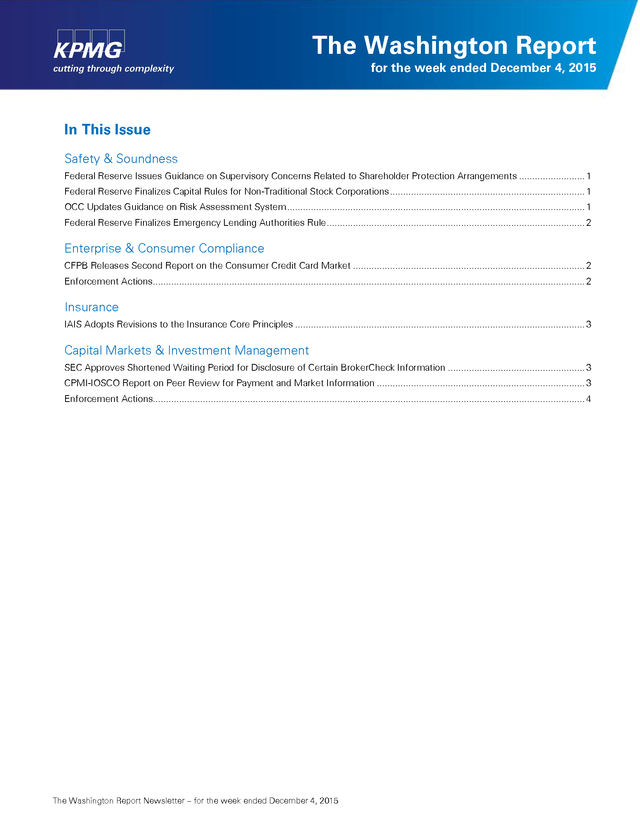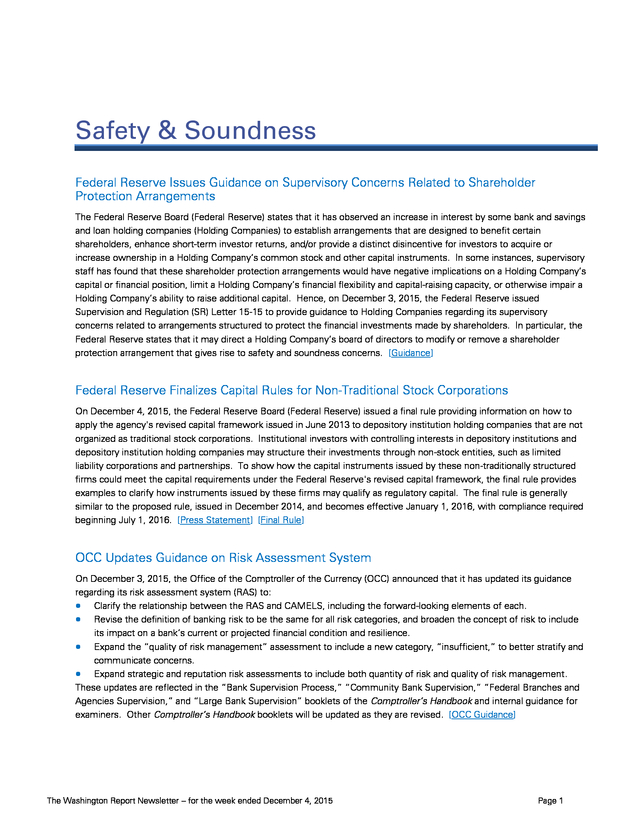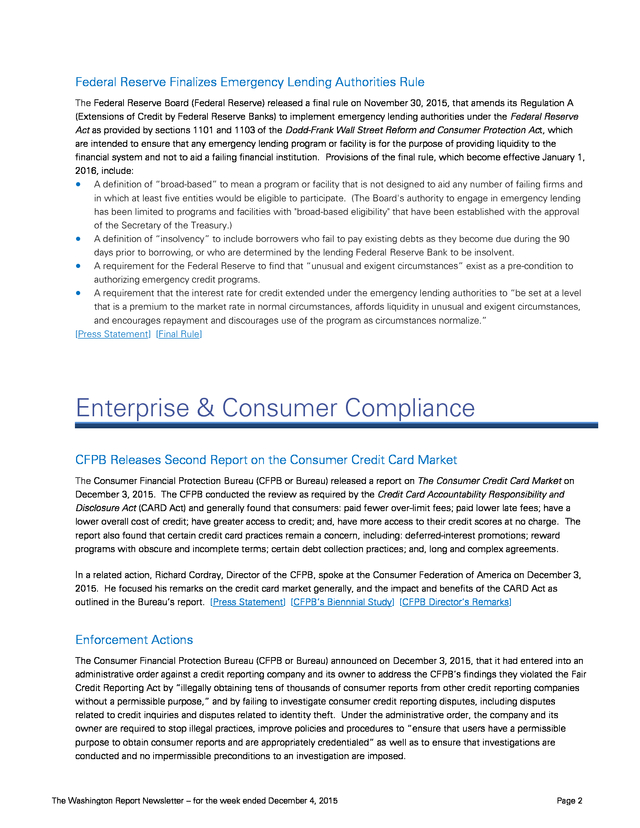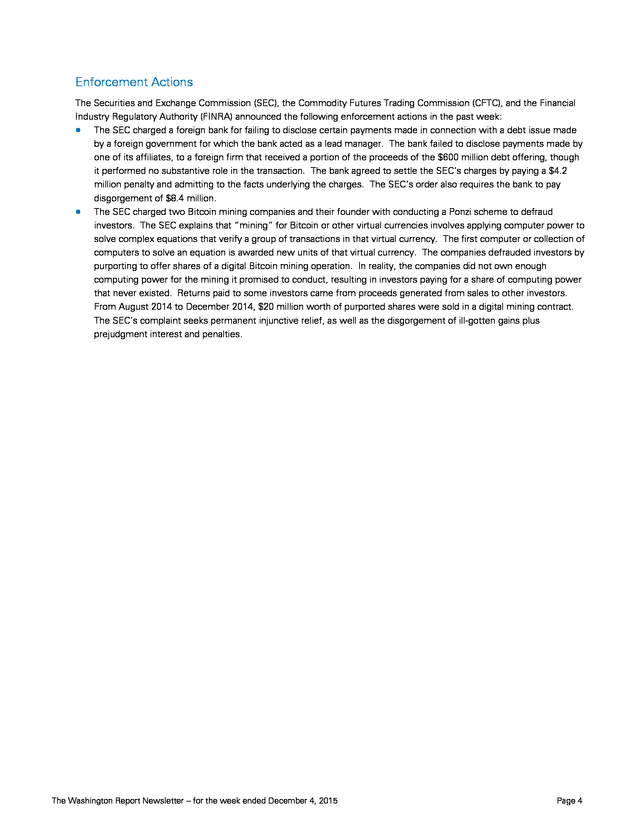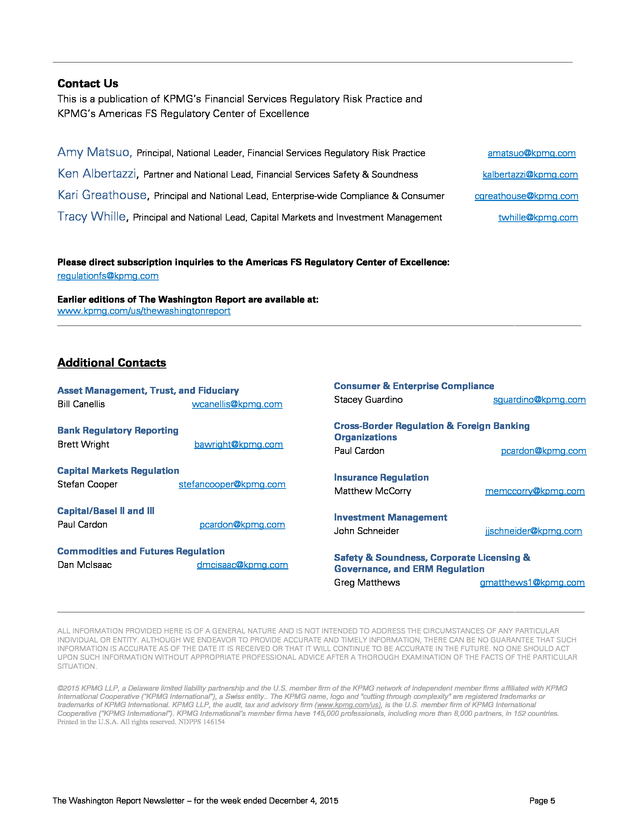Description
The Washington Report
for the week ended December 4, 2015
In This Issue
Safety & Soundness
Federal Reserve Issues Guidance on Supervisory Concerns Related to Shareholder Protection Arrangements ......................... 1
Federal Reserve Finalizes Capital Rules for Non-Traditional Stock Corporations .......................................................................... 1
OCC Updates Guidance on Risk Assessment System ................................................................................................................. 1
Federal Reserve Finalizes Emergency Lending Authorities Rule ..................................................................................................
2 Enterprise & Consumer Compliance CFPB Releases Second Report on the Consumer Credit Card Market ........................................................................................ 2 Enforcement Actions.................................................................................................................................................................... 2 Insurance IAIS Adopts Revisions to the Insurance Core Principles ..............................................................................................................
3 Capital Markets & Investment Management SEC Approves Shortened Waiting Period for Disclosure of Certain BrokerCheck Information .................................................... 3 CPMI-IOSCO Report on Peer Review for Payment and Market Information ............................................................................... 3 Enforcement Actions....................................................................................................................................................................
4 The Washington Report Newsletter – for the week ended December 4, 2015 . The Washington Report Safety & Soundness Federal Reserve Issues Guidance on Supervisory Concerns Related to Shareholder Protection Arrangements The Federal Reserve Board (Federal Reserve) states that it has observed an increase in interest by some bank and savings and loan holding companies (Holding Companies) to establish arrangements that are designed to benefit certain shareholders, enhance short-term investor returns, and/or provide a distinct disincentive for investors to acquire or increase ownership in a Holding Company’s common stock and other capital instruments. In some instances, supervisory staff has found that these shareholder protection arrangements would have negative implications on a Holding Company’s capital or financial position, limit a Holding Company’s financial flexibility and capital-raising capacity, or otherwise impair a Holding Company’s ability to raise additional capital. Hence, on December 3, 2015, the Federal Reserve issued Supervision and Regulation (SR) Letter 15-15 to provide guidance to Holding Companies regarding its supervisory concerns related to arrangements structured to protect the financial investments made by shareholders. In particular, the Federal Reserve states that it may direct a Holding Company’s board of directors to modify or remove a shareholder protection arrangement that gives rise to safety and soundness concerns.
[Guidance] Federal Reserve Finalizes Capital Rules for Non-Traditional Stock Corporations On December 4, 2015, the Federal Reserve Board (Federal Reserve) issued a final rule providing information on how to apply the agency's revised capital framework issued in June 2013 to depository institution holding companies that are not organized as traditional stock corporations. Institutional investors with controlling interests in depository institutions and depository institution holding companies may structure their investments through non-stock entities, such as limited liability corporations and partnerships. To show how the capital instruments issued by these non-traditionally structured firms could meet the capital requirements under the Federal Reserve's revised capital framework, the final rule provides examples to clarify how instruments issued by these firms may qualify as regulatory capital.
The final rule is generally similar to the proposed rule, issued in December 2014, and becomes effective January 1, 2016, with compliance required beginning July 1, 2016. [Press Statement] [Final Rule] OCC Updates Guidance on Risk Assessment System On December 3, 2015, the Office of the Comptroller of the Currency (OCC) announced that it has updated its guidance regarding its risk assessment system (RAS) to: ï‚· Clarify the relationship between the RAS and CAMELS, including the forward-looking elements of each. ï‚· Revise the definition of banking risk to be the same for all risk categories, and broaden the concept of risk to include its impact on a bank’s current or projected financial condition and resilience. ï‚· Expand the “quality of risk management” assessment to include a new category, “insufficient,” to better stratify and communicate concerns. ï‚· Expand strategic and reputation risk assessments to include both quantity of risk and quality of risk management. These updates are reflected in the “Bank Supervision Process,” “Community Bank Supervision,” “Federal Branches and Agencies Supervision,” and “Large Bank Supervision” booklets of the Comptroller’s Handbook and internal guidance for examiners. Other Comptroller’s Handbook booklets will be updated as they are revised.
[OCC Guidance] The Washington Report Newsletter – for the week ended December 4, 2015 Page 1 . Federal Reserve Finalizes Emergency Lending Authorities Rule The Federal Reserve Board (Federal Reserve) released a final rule on November 30, 2015, that amends its Regulation A (Extensions of Credit by Federal Reserve Banks) to implement emergency lending authorities under the Federal Reserve Act as provided by sections 1101 and 1103 of the Dodd-Frank Wall Street Reform and Consumer Protection Act, which are intended to ensure that any emergency lending program or facility is for the purpose of providing liquidity to the financial system and not to aid a failing financial institution. Provisions of the final rule, which become effective January 1, 2016, include: ï‚· A definition of “broad-based” to mean a program or facility that is not designed to aid any number of failing firms and in which at least five entities would be eligible to participate. (The Board's authority to engage in emergency lending has been limited to programs and facilities with "broad-based eligibility" that have been established with the approval of the Secretary of the Treasury.) ï‚· A definition of “insolvency” to include borrowers who fail to pay existing debts as they become due during the 90 days prior to borrowing, or who are determined by the lending Federal Reserve Bank to be insolvent. ï‚· A requirement for the Federal Reserve to find that “unusual and exigent circumstances” exist as a pre-condition to authorizing emergency credit programs. ï‚· A requirement that the interest rate for credit extended under the emergency lending authorities to “be set at a level that is a premium to the market rate in normal circumstances, affords liquidity in unusual and exigent circumstances, and encourages repayment and discourages use of the program as circumstances normalize.” [Press Statement] [Final Rule] Enterprise & Consumer Compliance CFPB Releases Second Report on the Consumer Credit Card Market The Consumer Financial Protection Bureau (CFPB or Bureau) released a report on The Consumer Credit Card Market on December 3, 2015. The CFPB conducted the review as required by the Credit Card Accountability Responsibility and Disclosure Act (CARD Act) and generally found that consumers: paid fewer over-limit fees; paid lower late fees; have a lower overall cost of credit; have greater access to credit; and, have more access to their credit scores at no charge.
The report also found that certain credit card practices remain a concern, including: deferred-interest promotions; reward programs with obscure and incomplete terms; certain debt collection practices; and, long and complex agreements. In a related action, Richard Cordray, Director of the CFPB, spoke at the Consumer Federation of America on December 3, 2015. He focused his remarks on the credit card market generally, and the impact and benefits of the CARD Act as outlined in the Bureau’s report. [Press Statement] [CFPB’s Biennnial Study] [CFPB Director’s Remarks] Enforcement Actions The Consumer Financial Protection Bureau (CFPB or Bureau) announced on December 3, 2015, that it had entered into an administrative order against a credit reporting company and its owner to address the CFPB’s findings they violated the Fair Credit Reporting Act by “illegally obtaining tens of thousands of consumer reports from other credit reporting companies without a permissible purpose,” and by failing to investigate consumer credit reporting disputes, including disputes related to credit inquiries and disputes related to identity theft.
Under the administrative order, the company and its owner are required to stop illegal practices, improve policies and procedures to “ensure that users have a permissible purpose to obtain consumer reports and are appropriately credentialed” as well as to ensure that investigations are conducted and no impermissible preconditions to an investigation are imposed. The Washington Report Newsletter – for the week ended December 4, 2015 Page 2 . Insurance IAIS Adopts Revisions to the Insurance Core Principles The International Association of Insurance Supervisors (IAIS) announced on December 2, 2015, that it had adopted revisions to the Insurance Core Principles at its Annual General Meeting on November 12, 2015. More specifically, revisions were adopted for the following principles: ICP 4 (Licensing), ICP 5 (Suitability of Persons), ICP 7 (Corporate Governance), ICP 8 (Risk Management and Internal Controls), ICP 23 (Group-wide Supervision), and ICP 25 (Supervisory Cooperation and Coordination). The IAIS indicates the revisions came following the conclusion of comprehensive SelfAssessments and Peer Reviews of the related ICPs, taking into account recent developments in group supervision, corporate governance and risk management, as well as principles, standards, and guidance issued by other standards setting bodies. [Press Statement] Capital Markets and Investment Management SEC Approves Shortened Waiting Period for Disclosure of Certain BrokerCheck Information The Financial Industry Regulatory Authority (FINRA) released Regulatory Notice 15-29 to announce that the Securities and Exchange Commission (SEC) approved a change to FINRA Rule 8312 (FINRA BrokerCheck Disclosure) that reduces the waiting period from 15 days to three business days for the release of certain information reported on the Form U5 (Uniform Termination Notice for Securities Industry Registration) through BrokerCheck.
The effective date of the change is December 12, 2015. [Press Statement] CPMI-IOSCO Report on Peer Review for Payment and Market Infrastructures The Committee on Payments and Market Infrastructures (CPMI) and the International Organization of Securities Commissions (IOSCO) published a report on the Assessment and review of application of Responsibilities for authorities on November 30, 2015. The report presents the findings of the CPMI-IOSCO assessment of the completeness and consistency of frameworks and outcomes arising from jurisdictions' implementation of the Responsibilities for authorities in the Principles for financial market infrastructures (PFMI), which outline international standards for payment, clearing, and settlement systems, including central counterparties.
The assessments covered implementation of the Responsibilities across all financial market infrastructure (FMI) types in 28 participating jurisdictions and were carried out as a peer review during 2015. The CPMI-IOSCO summarize that the assessment revealed a majority of the jurisdictions had achieved a high level of observance of the Responsibilities, noting that, of the 28 jurisdictions assessed, 16 fully observed the five Responsibilities for all FMI types; an additional two jurisdictions either fully or broadly observed each of the five Responsibilities for all FMI types. With respect to specific FMI types, the CPMI-IOSCIO found that jurisdictions most frequently fell short of a fully observed rating in the case of trade repositories.
[Press Statement] The Washington Report Newsletter – for the week ended December 4, 2015 Page 3 . Enforcement Actions The Securities and Exchange Commission (SEC), the Commodity Futures Trading Commission (CFTC), and the Financial Industry Regulatory Authority (FINRA) announced the following enforcement actions in the past week: ï‚· The SEC charged a foreign bank for failing to disclose certain payments made in connection with a debt issue made by a foreign government for which the bank acted as a lead manager. The bank failed to disclose payments made by one of its affiliates, to a foreign firm that received a portion of the proceeds of the $600 million debt offering, though it performed no substantive role in the transaction. The bank agreed to settle the SEC’s charges by paying a $4.2 million penalty and admitting to the facts underlying the charges. The SEC’s order also requires the bank to pay disgorgement of $8.4 million. ï‚· The SEC charged two Bitcoin mining companies and their founder with conducting a Ponzi scheme to defraud investors.
The SEC explains that “mining” for Bitcoin or other virtual currencies involves applying computer power to solve complex equations that verify a group of transactions in that virtual currency. The first computer or collection of computers to solve an equation is awarded new units of that virtual currency. The companies defrauded investors by purporting to offer shares of a digital Bitcoin mining operation.
In reality, the companies did not own enough computing power for the mining it promised to conduct, resulting in investors paying for a share of computing power that never existed. Returns paid to some investors came from proceeds generated from sales to other investors. From August 2014 to December 2014, $20 million worth of purported shares were sold in a digital mining contract. The SEC’s complaint seeks permanent injunctive relief, as well as the disgorgement of ill-gotten gains plus prejudgment interest and penalties. The Washington Report Newsletter – for the week ended December 4, 2015 Page 4 . ______________________________________________________________________________________________________________________________________________ Contact Us This is a publication of KPMG’s Financial Services Regulatory Risk Practice and KPMG’s Americas FS Regulatory Center of Excellence Amy Matsuo, Principal, National Leader, Financial Services Regulatory Risk Practice Ken Albertazzi, Partner and National Lead, Financial Services Safety & Soundness amatsuo@kpmg.com kalbertazzi@kpmg.com Kari Greathouse, Principal and National Lead, Enterprise-wide Compliance & Consumer cgreathouse@kpmg.com Tracy Whille, Principal and National Lead, Capital Markets and Investment Management twhille@kpmg.com Please direct subscription inquiries to the Americas FS Regulatory Center of Excellence: regulationfs@kpmg.com Earlier editions of The Washington Report are available at: www.kpmg.com/us/thewashingtonreport _______________________________________________________________________________________________________________________________________________ Additional Contacts Asset Management, Trust, and Fiduciary Bill Canellis wcanellis@kpmg.com Consumer & Enterprise Compliance Stacey Guardino sguardino@kpmg.com Bank Regulatory Reporting Brett Wright Cross-Border Regulation & Foreign Banking Organizations Paul Cardon pcardon@kpmg.com bawright@kpmg.com Capital Markets Regulation Stefan Cooper stefancooper@kpmg.com Capital/Basel II and III Paul Cardon pcardon@kpmg.com Commodities and Futures Regulation Dan McIsaac dmcisaac@kpmg.com Insurance Regulation Matthew McCorry memccorry@kpmg.com Investment Management John Schneider jjschneider@kpmg.com Safety & Soundness, Corporate Licensing & Governance, and ERM Regulation Greg Matthews gmatthews1@kpmg.com ________________________________________________________________________________________________________________________________________________ ALL INFORMATION PROVIDED HERE IS OF A GENERAL NATURE AND IS NOT INTENDED TO ADDRESS THE CIRCUMSTANCES OF ANY PARTICULAR INDIVIDUAL OR ENTITY. ALTHOUGH WE ENDEAVOR TO PROVIDE ACCURATE AND TIMELY INFORMATION, THERE CAN BE NO GUARANTEE THAT SUCH INFORMATION IS ACCURATE AS OF THE DATE IT IS RECEIVED OR THAT IT WILL CONTINUE TO BE ACCURATE IN THE FUTURE. NO ONE SHOULD ACT UPON SUCH INFORMATION WITHOUT APPROPRIATE PROFESSIONAL ADVICE AFTER A THOROUGH EXAMINATION OF THE FACTS OF THE PARTICULAR SITUATION. ©2015 KPMG LLP, a Delaware limited liability partnership and the U.S. member firm of the KPMG network of independent member firms affiliated with KPMG International Cooperative ("KPMG International"), a Swiss entity..
The KPMG name, logo and “cutting through complexity” are registered trademarks or trademarks of KPMG International. KPMG LLP, the audit, tax and advisory firm (www.kpmg.com/us), is the U.S. member firm of KPMG International Cooperative ("KPMG International").
KPMG International’s member firms have 145,000 professionals, including more than 8,000 partners, in 152 countries. Printed in the U.S.A. All rights reserved. NDPPS 146154 The Washington Report Newsletter – for the week ended December 4, 2015 Page 5 .
2 Enterprise & Consumer Compliance CFPB Releases Second Report on the Consumer Credit Card Market ........................................................................................ 2 Enforcement Actions.................................................................................................................................................................... 2 Insurance IAIS Adopts Revisions to the Insurance Core Principles ..............................................................................................................
3 Capital Markets & Investment Management SEC Approves Shortened Waiting Period for Disclosure of Certain BrokerCheck Information .................................................... 3 CPMI-IOSCO Report on Peer Review for Payment and Market Information ............................................................................... 3 Enforcement Actions....................................................................................................................................................................
4 The Washington Report Newsletter – for the week ended December 4, 2015 . The Washington Report Safety & Soundness Federal Reserve Issues Guidance on Supervisory Concerns Related to Shareholder Protection Arrangements The Federal Reserve Board (Federal Reserve) states that it has observed an increase in interest by some bank and savings and loan holding companies (Holding Companies) to establish arrangements that are designed to benefit certain shareholders, enhance short-term investor returns, and/or provide a distinct disincentive for investors to acquire or increase ownership in a Holding Company’s common stock and other capital instruments. In some instances, supervisory staff has found that these shareholder protection arrangements would have negative implications on a Holding Company’s capital or financial position, limit a Holding Company’s financial flexibility and capital-raising capacity, or otherwise impair a Holding Company’s ability to raise additional capital. Hence, on December 3, 2015, the Federal Reserve issued Supervision and Regulation (SR) Letter 15-15 to provide guidance to Holding Companies regarding its supervisory concerns related to arrangements structured to protect the financial investments made by shareholders. In particular, the Federal Reserve states that it may direct a Holding Company’s board of directors to modify or remove a shareholder protection arrangement that gives rise to safety and soundness concerns.
[Guidance] Federal Reserve Finalizes Capital Rules for Non-Traditional Stock Corporations On December 4, 2015, the Federal Reserve Board (Federal Reserve) issued a final rule providing information on how to apply the agency's revised capital framework issued in June 2013 to depository institution holding companies that are not organized as traditional stock corporations. Institutional investors with controlling interests in depository institutions and depository institution holding companies may structure their investments through non-stock entities, such as limited liability corporations and partnerships. To show how the capital instruments issued by these non-traditionally structured firms could meet the capital requirements under the Federal Reserve's revised capital framework, the final rule provides examples to clarify how instruments issued by these firms may qualify as regulatory capital.
The final rule is generally similar to the proposed rule, issued in December 2014, and becomes effective January 1, 2016, with compliance required beginning July 1, 2016. [Press Statement] [Final Rule] OCC Updates Guidance on Risk Assessment System On December 3, 2015, the Office of the Comptroller of the Currency (OCC) announced that it has updated its guidance regarding its risk assessment system (RAS) to: ï‚· Clarify the relationship between the RAS and CAMELS, including the forward-looking elements of each. ï‚· Revise the definition of banking risk to be the same for all risk categories, and broaden the concept of risk to include its impact on a bank’s current or projected financial condition and resilience. ï‚· Expand the “quality of risk management” assessment to include a new category, “insufficient,” to better stratify and communicate concerns. ï‚· Expand strategic and reputation risk assessments to include both quantity of risk and quality of risk management. These updates are reflected in the “Bank Supervision Process,” “Community Bank Supervision,” “Federal Branches and Agencies Supervision,” and “Large Bank Supervision” booklets of the Comptroller’s Handbook and internal guidance for examiners. Other Comptroller’s Handbook booklets will be updated as they are revised.
[OCC Guidance] The Washington Report Newsletter – for the week ended December 4, 2015 Page 1 . Federal Reserve Finalizes Emergency Lending Authorities Rule The Federal Reserve Board (Federal Reserve) released a final rule on November 30, 2015, that amends its Regulation A (Extensions of Credit by Federal Reserve Banks) to implement emergency lending authorities under the Federal Reserve Act as provided by sections 1101 and 1103 of the Dodd-Frank Wall Street Reform and Consumer Protection Act, which are intended to ensure that any emergency lending program or facility is for the purpose of providing liquidity to the financial system and not to aid a failing financial institution. Provisions of the final rule, which become effective January 1, 2016, include: ï‚· A definition of “broad-based” to mean a program or facility that is not designed to aid any number of failing firms and in which at least five entities would be eligible to participate. (The Board's authority to engage in emergency lending has been limited to programs and facilities with "broad-based eligibility" that have been established with the approval of the Secretary of the Treasury.) ï‚· A definition of “insolvency” to include borrowers who fail to pay existing debts as they become due during the 90 days prior to borrowing, or who are determined by the lending Federal Reserve Bank to be insolvent. ï‚· A requirement for the Federal Reserve to find that “unusual and exigent circumstances” exist as a pre-condition to authorizing emergency credit programs. ï‚· A requirement that the interest rate for credit extended under the emergency lending authorities to “be set at a level that is a premium to the market rate in normal circumstances, affords liquidity in unusual and exigent circumstances, and encourages repayment and discourages use of the program as circumstances normalize.” [Press Statement] [Final Rule] Enterprise & Consumer Compliance CFPB Releases Second Report on the Consumer Credit Card Market The Consumer Financial Protection Bureau (CFPB or Bureau) released a report on The Consumer Credit Card Market on December 3, 2015. The CFPB conducted the review as required by the Credit Card Accountability Responsibility and Disclosure Act (CARD Act) and generally found that consumers: paid fewer over-limit fees; paid lower late fees; have a lower overall cost of credit; have greater access to credit; and, have more access to their credit scores at no charge.
The report also found that certain credit card practices remain a concern, including: deferred-interest promotions; reward programs with obscure and incomplete terms; certain debt collection practices; and, long and complex agreements. In a related action, Richard Cordray, Director of the CFPB, spoke at the Consumer Federation of America on December 3, 2015. He focused his remarks on the credit card market generally, and the impact and benefits of the CARD Act as outlined in the Bureau’s report. [Press Statement] [CFPB’s Biennnial Study] [CFPB Director’s Remarks] Enforcement Actions The Consumer Financial Protection Bureau (CFPB or Bureau) announced on December 3, 2015, that it had entered into an administrative order against a credit reporting company and its owner to address the CFPB’s findings they violated the Fair Credit Reporting Act by “illegally obtaining tens of thousands of consumer reports from other credit reporting companies without a permissible purpose,” and by failing to investigate consumer credit reporting disputes, including disputes related to credit inquiries and disputes related to identity theft.
Under the administrative order, the company and its owner are required to stop illegal practices, improve policies and procedures to “ensure that users have a permissible purpose to obtain consumer reports and are appropriately credentialed” as well as to ensure that investigations are conducted and no impermissible preconditions to an investigation are imposed. The Washington Report Newsletter – for the week ended December 4, 2015 Page 2 . Insurance IAIS Adopts Revisions to the Insurance Core Principles The International Association of Insurance Supervisors (IAIS) announced on December 2, 2015, that it had adopted revisions to the Insurance Core Principles at its Annual General Meeting on November 12, 2015. More specifically, revisions were adopted for the following principles: ICP 4 (Licensing), ICP 5 (Suitability of Persons), ICP 7 (Corporate Governance), ICP 8 (Risk Management and Internal Controls), ICP 23 (Group-wide Supervision), and ICP 25 (Supervisory Cooperation and Coordination). The IAIS indicates the revisions came following the conclusion of comprehensive SelfAssessments and Peer Reviews of the related ICPs, taking into account recent developments in group supervision, corporate governance and risk management, as well as principles, standards, and guidance issued by other standards setting bodies. [Press Statement] Capital Markets and Investment Management SEC Approves Shortened Waiting Period for Disclosure of Certain BrokerCheck Information The Financial Industry Regulatory Authority (FINRA) released Regulatory Notice 15-29 to announce that the Securities and Exchange Commission (SEC) approved a change to FINRA Rule 8312 (FINRA BrokerCheck Disclosure) that reduces the waiting period from 15 days to three business days for the release of certain information reported on the Form U5 (Uniform Termination Notice for Securities Industry Registration) through BrokerCheck.
The effective date of the change is December 12, 2015. [Press Statement] CPMI-IOSCO Report on Peer Review for Payment and Market Infrastructures The Committee on Payments and Market Infrastructures (CPMI) and the International Organization of Securities Commissions (IOSCO) published a report on the Assessment and review of application of Responsibilities for authorities on November 30, 2015. The report presents the findings of the CPMI-IOSCO assessment of the completeness and consistency of frameworks and outcomes arising from jurisdictions' implementation of the Responsibilities for authorities in the Principles for financial market infrastructures (PFMI), which outline international standards for payment, clearing, and settlement systems, including central counterparties.
The assessments covered implementation of the Responsibilities across all financial market infrastructure (FMI) types in 28 participating jurisdictions and were carried out as a peer review during 2015. The CPMI-IOSCO summarize that the assessment revealed a majority of the jurisdictions had achieved a high level of observance of the Responsibilities, noting that, of the 28 jurisdictions assessed, 16 fully observed the five Responsibilities for all FMI types; an additional two jurisdictions either fully or broadly observed each of the five Responsibilities for all FMI types. With respect to specific FMI types, the CPMI-IOSCIO found that jurisdictions most frequently fell short of a fully observed rating in the case of trade repositories.
[Press Statement] The Washington Report Newsletter – for the week ended December 4, 2015 Page 3 . Enforcement Actions The Securities and Exchange Commission (SEC), the Commodity Futures Trading Commission (CFTC), and the Financial Industry Regulatory Authority (FINRA) announced the following enforcement actions in the past week: ï‚· The SEC charged a foreign bank for failing to disclose certain payments made in connection with a debt issue made by a foreign government for which the bank acted as a lead manager. The bank failed to disclose payments made by one of its affiliates, to a foreign firm that received a portion of the proceeds of the $600 million debt offering, though it performed no substantive role in the transaction. The bank agreed to settle the SEC’s charges by paying a $4.2 million penalty and admitting to the facts underlying the charges. The SEC’s order also requires the bank to pay disgorgement of $8.4 million. ï‚· The SEC charged two Bitcoin mining companies and their founder with conducting a Ponzi scheme to defraud investors.
The SEC explains that “mining” for Bitcoin or other virtual currencies involves applying computer power to solve complex equations that verify a group of transactions in that virtual currency. The first computer or collection of computers to solve an equation is awarded new units of that virtual currency. The companies defrauded investors by purporting to offer shares of a digital Bitcoin mining operation.
In reality, the companies did not own enough computing power for the mining it promised to conduct, resulting in investors paying for a share of computing power that never existed. Returns paid to some investors came from proceeds generated from sales to other investors. From August 2014 to December 2014, $20 million worth of purported shares were sold in a digital mining contract. The SEC’s complaint seeks permanent injunctive relief, as well as the disgorgement of ill-gotten gains plus prejudgment interest and penalties. The Washington Report Newsletter – for the week ended December 4, 2015 Page 4 . ______________________________________________________________________________________________________________________________________________ Contact Us This is a publication of KPMG’s Financial Services Regulatory Risk Practice and KPMG’s Americas FS Regulatory Center of Excellence Amy Matsuo, Principal, National Leader, Financial Services Regulatory Risk Practice Ken Albertazzi, Partner and National Lead, Financial Services Safety & Soundness amatsuo@kpmg.com kalbertazzi@kpmg.com Kari Greathouse, Principal and National Lead, Enterprise-wide Compliance & Consumer cgreathouse@kpmg.com Tracy Whille, Principal and National Lead, Capital Markets and Investment Management twhille@kpmg.com Please direct subscription inquiries to the Americas FS Regulatory Center of Excellence: regulationfs@kpmg.com Earlier editions of The Washington Report are available at: www.kpmg.com/us/thewashingtonreport _______________________________________________________________________________________________________________________________________________ Additional Contacts Asset Management, Trust, and Fiduciary Bill Canellis wcanellis@kpmg.com Consumer & Enterprise Compliance Stacey Guardino sguardino@kpmg.com Bank Regulatory Reporting Brett Wright Cross-Border Regulation & Foreign Banking Organizations Paul Cardon pcardon@kpmg.com bawright@kpmg.com Capital Markets Regulation Stefan Cooper stefancooper@kpmg.com Capital/Basel II and III Paul Cardon pcardon@kpmg.com Commodities and Futures Regulation Dan McIsaac dmcisaac@kpmg.com Insurance Regulation Matthew McCorry memccorry@kpmg.com Investment Management John Schneider jjschneider@kpmg.com Safety & Soundness, Corporate Licensing & Governance, and ERM Regulation Greg Matthews gmatthews1@kpmg.com ________________________________________________________________________________________________________________________________________________ ALL INFORMATION PROVIDED HERE IS OF A GENERAL NATURE AND IS NOT INTENDED TO ADDRESS THE CIRCUMSTANCES OF ANY PARTICULAR INDIVIDUAL OR ENTITY. ALTHOUGH WE ENDEAVOR TO PROVIDE ACCURATE AND TIMELY INFORMATION, THERE CAN BE NO GUARANTEE THAT SUCH INFORMATION IS ACCURATE AS OF THE DATE IT IS RECEIVED OR THAT IT WILL CONTINUE TO BE ACCURATE IN THE FUTURE. NO ONE SHOULD ACT UPON SUCH INFORMATION WITHOUT APPROPRIATE PROFESSIONAL ADVICE AFTER A THOROUGH EXAMINATION OF THE FACTS OF THE PARTICULAR SITUATION. ©2015 KPMG LLP, a Delaware limited liability partnership and the U.S. member firm of the KPMG network of independent member firms affiliated with KPMG International Cooperative ("KPMG International"), a Swiss entity..
The KPMG name, logo and “cutting through complexity” are registered trademarks or trademarks of KPMG International. KPMG LLP, the audit, tax and advisory firm (www.kpmg.com/us), is the U.S. member firm of KPMG International Cooperative ("KPMG International").
KPMG International’s member firms have 145,000 professionals, including more than 8,000 partners, in 152 countries. Printed in the U.S.A. All rights reserved. NDPPS 146154 The Washington Report Newsletter – for the week ended December 4, 2015 Page 5 .



